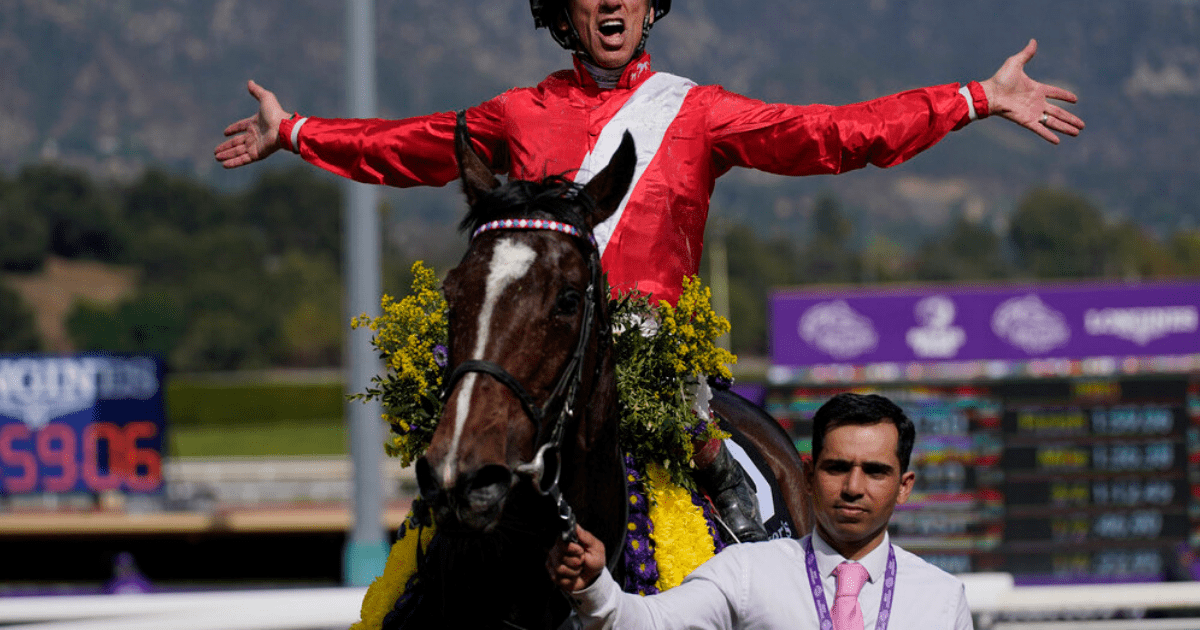Frankie Dettori is making waves in America with his recent big-money wins, including one for an English trainer who has a record of breaking the rules. The legendary jockey is raking in around £8,500 per race at Santa Anita racecourse in California, after leaving Britain following his stint on I'm a Celeb and his lackluster performance at the BBC Sports Personality of the Year awards.
Victorious Ride for Dan Blacker
During his time in America, Dettori secured a notable victory for trainer Dan Blacker. The 41-year-old trainer, originally from Oxford, made headlines last year when he was found to have broken the same rule a staggering 527 times. Despite this, Blacker was allowed to continue training horses.
Virat's Win
Dettori rode Blacker's horse, Virat, to victory in a six-furlong turf race, earning the winning connections more than £18,000. Blacker expressed his gratitude for having Dettori on board and spoke of how much the win meant to him. He mentioned watching Dettori's successful career from the sidelines and admiring his skills as a champion jockey.
It is important to gamble responsibly.
Frequently Asked Questions
What is the initial step to training a racing horse?
Breaking is an important part of the initial phase of training racehorses. This involves the horse becoming accustomed carrying a bridle, saddle, and weight of a person. During these early sessions, patience and gentle handling are paramount to ensure the horse learns to be comfortable with human interaction and the equipment it will wear throughout its racing career.
What is the age at which a horse should begin racing training?
While horses can begin basic race training as young yearlings (or even younger), most start their more intensive training when they reach two years of age. This is when their bodies are mature enough to handle the stresses of the track while still being young and adaptable for the learning process. The exact timing can vary depending on each horse’s temperament and development.
What role does a jockey play in the training of a racehorse?
Jockeys have a crucial role to play in the training of racehorses. Jockeys not only provide feedback to the horses on their performance during training, but they also educate the horses about racing tactics such as pacing and positioning. A good jockey is able to recognize the horse’s strengths, weaknesses and how they can be improved.
How can I prepare my horse for racing?
Racehorse conditioning is a gradual, multi-faceted process. It involves both longer, slower distance work, which builds stamina, as well shorter, quicker workouts, which develop speed. The cardiovascular system, muscle structure, and bone structure of the horse must be developed over time with a specially designed exercise regime that mimics race conditions without injury or stress.
How often must racehorses receive training?
Training frequency for racehorses is usually tailored to the individual horse’s needs, level of fitness, and racing schedule. They would usually have a daily regimen consisting of walking, trotting and cantering with more intense work like galloping and breezing a few times a week in order to build speed and stamina. Rest days allow the horse time to recover from training and to avoid overtraining.
What’s the best kind of diet for racing horses to follow?
The diet of a racehorse must be balanced and high-quality to meet the demands for energy during training and racing. The feed is a mix of commercially produced racehorse-specific feed, high-grade hay and grains such as barley or oatmeal. In addition, essential vitamins should be added to the diet in order to maintain peak performance and overall health.
Statistics
- Racehorse mortality rates during racing have been observed to be between 1.5 to 2 deaths per thousand starts, depending on the racing jurisdiction.
- An extensive survey indicated that over 90% of racehorse trainers utilize swimming as a low-impact exercise in their conditioning routines.
- The majority of racehorses in training are subject to an exercise regimen that includes being ridden six days a week.
- Statistically, less than 1% of thoroughbred foals born each year will go on to win a stakes race.
- The average racehorse reaches its peak physical ability between the ages of four to five, with some variation based on the breed and individual development.
- Studies suggest that proper early training can reduce the risk of musculoskeletal injuries in racehorses by up to 50%.
External Links
paulickreport.com
racingpost.com
keeneland.com
horseracing.com
jockeyclub.com
theridinginstructor.net
How To
How to Train a Young Racehorse
Beginner’s training for a young horse should focus on building familiarity and trust. Introduce the horse to a bridle, saddle, and the sensation of a rider’s weight, ensuring each new experience is positive. The horse should be taught the basic commands of walk, halt and turn before moving on to trotting. Consistency and a patient approach are key. The emphasis should be on gentle reinforcement, building confidence, and preventing stress or injury.

